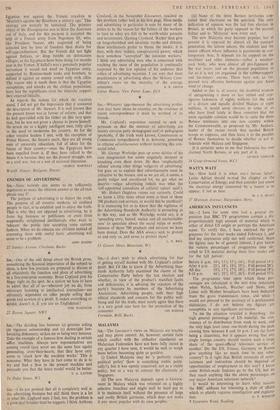SIR,—Whatever apprehension the advertising profes- sion may have about its
enemies, on the evidence of recent correspondence it must be terrified of its friends.
Mr. Copland's exposition seemed to seek to persuade us that the enemies of advertising are mainly envious petty demagogues and/or pedagogues (probably, if the truth were known, Communists or Cominunist sympathisers). It is, however, permitted to criticise advertisements without incurring this anti- social label. . , Mr. George Worledge puts up•some skittles of his Own imagination but seems singularly inexpert in knocking even them down. He then 'emphatically refutes' among other things 'vulgarity of advertising' but goes on to explain that advertisements must be attractive to the masses, and as we are all, it seems, a pretty vulgar and uncultured lot, we get what we deserve—vulgar advertising (which was what the `self-appointed custodians of cultut'al values' said!).
Mr. Hubert Oughton rouses our curiosity. Could we know a little more about some at least of those 700 products and services, or would this be unethical? It is reassuring for us to know that the vigilance of the Advertising Standards Authority is protecting us in this way, and as Mr. Worledge would say, it is 'spreading envy, hatred, malice and all uncharitable- ness' to speculate about the social value or worth- lessness of those 700 products and services we have been denied. Does the ASA always seek to protect us and only us, and never to protect them?


































 Previous page
Previous page